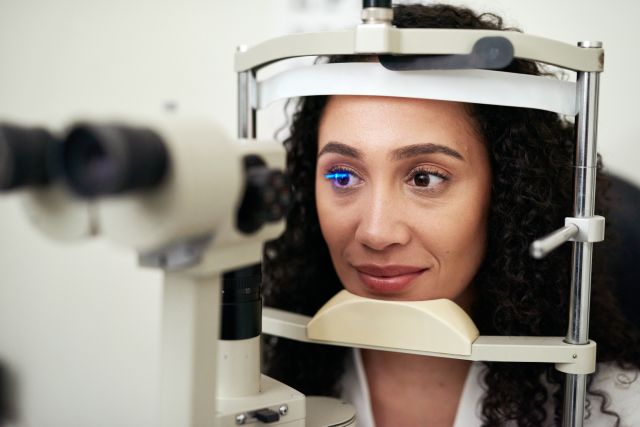Updated on October 24, 2023
Regular eye exams are important for preserving your vision, maintaining good eye health, and checking for evidence of chronic medical conditions. But more and more research suggests they could also lower your risk of dementia down the road.
Dementia risk factors
Dementia is an umbrella term for impairments involving the ability to remember, make decisions, and think clearly. The most common type is Alzheimer’s disease, which accounts for up to 80 percent of dementia cases. Other forms of dementia include vascular dementia, Lewy body dementia, and frontotemporal dementia.
Your risk of developing dementia involves many things that can’t be changed, such as age, race, ethnicity, and family history. For example, if you have a close relative with Alzheimer’s, your own risk of developing it goes up about 30 percent.
But there are many dementia risk factors that you can modify. Heart health issues such as high blood pressure and high cholesterol can raise your risk, as can unhealthy lifestyle choices, such as smoking and binge drinking.
To lower your risk for dementia, the Centers for Disease Control and Prevention (CDC) has many recommendations, including being consistently active, maintaining a healthy weight, managing your blood sugar and blood pressure, and taking care of your mental health.
The CDC also urges prevention and correction of hearing issues. Studies have linked hearing impairment with dementia risk since the late 1980s. Researchers have found that uncorrected hearing difficulties can change how the brain processes information. They can also lead to being more socially isolated, which can deprive your brain of the important stimulation of conversations and close relationships.
Increasingly, researchers have found similarly powerful evidence for taking good care of your vision.
Eyesight and dementia
A growing body of research has established a relationship between vision loss and dementia. For example, a review and meta-analysis published in the journal Ophthalmology in 2021 found that vision impairment was associated with a higher risk of both cognitive decline and dementia in older adults.
Another study, published in 2021 in JAMA Network Open, looked in more detail at different types of vision impairment—depth perception, the ability to see things at different distances, and the ability to see things at different levels of brightness (contrast sensitivity). And instead of looking at dementia as a whole, researchers broke it into five different categories (language, memory, attention, visuospatial ability, and executive function) to better understand the potential types of cognitive decline.
Ultimately, each type of visual impairment was linked to declines in memory and language. Poor contrast sensitivity was also tied to drops in attention and visuospatial ability, or your brain’s capacity to connect what you see to the space around you.
How vision affects cognition
Scientists aren’t completely certain how vision issues contribute to dementia or how dementia contributes to vision issues, though they continue to study how the two are linked. Research suggests a relationship similar to that of hearing impairment and dementia, where a lack of sensory input affects other healthy behaviors. In other words, when you can’t see well, participating in activities and maintaining social relationships gets harder. This can lead to social isolation, a known risk factor for dementia.
As with hearing issues, vision impairment may also contribute to changes in brain chemistry and function. This can add to dementia risk, too.
Eye exams for reducing dementia risk
Regular eye exams are important for preserving eye health—and perhaps for lowering dementia risk. In a 2022 study published in JAMA Neurology, researchers speculated that up to 100,000 people (1.8 percent of dementia cases in the United States) diagnosed with dementia might have been able to avoid developing the condition if they had accessed better eye care.
Another 2022 study published in JAMA Internal Medicine found that when people had their cataracts removed, their risk of developing dementia lowered significantly.
The American Academy of Ophthalmology recommends that adults receive a complete eye exam at age 40. Certain people should have a complete exam sooner, including those with existing eye disease or risk factors such as diabetes or high blood pressure. Additionally, everyone should get their eyes checked regularly—especially adults aged 65 and over, who may be affected more by visual impairment and diseases of the eye.






